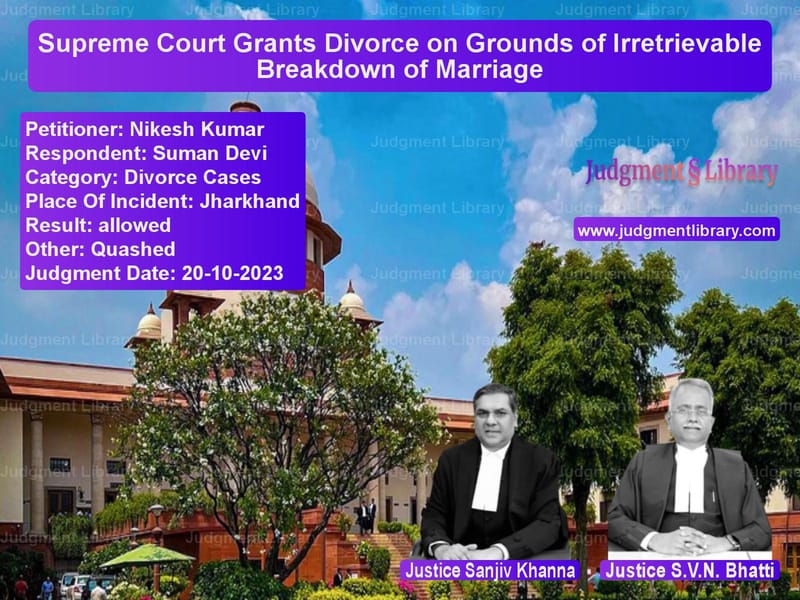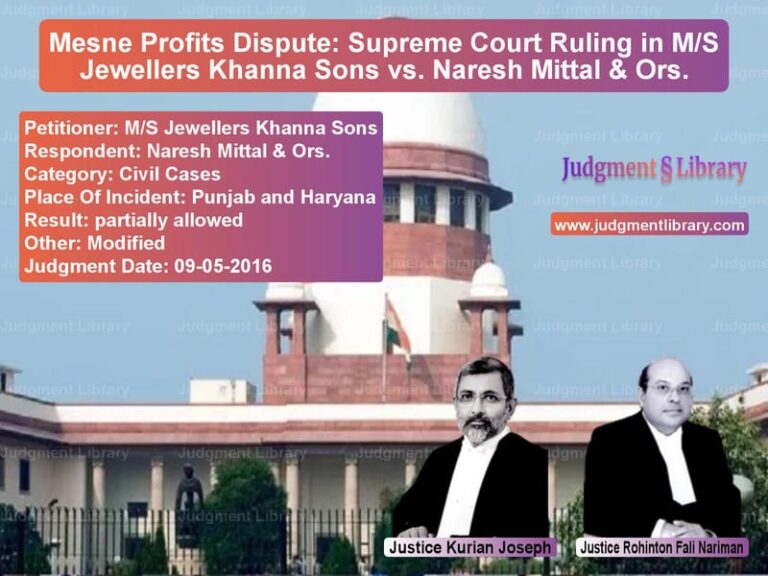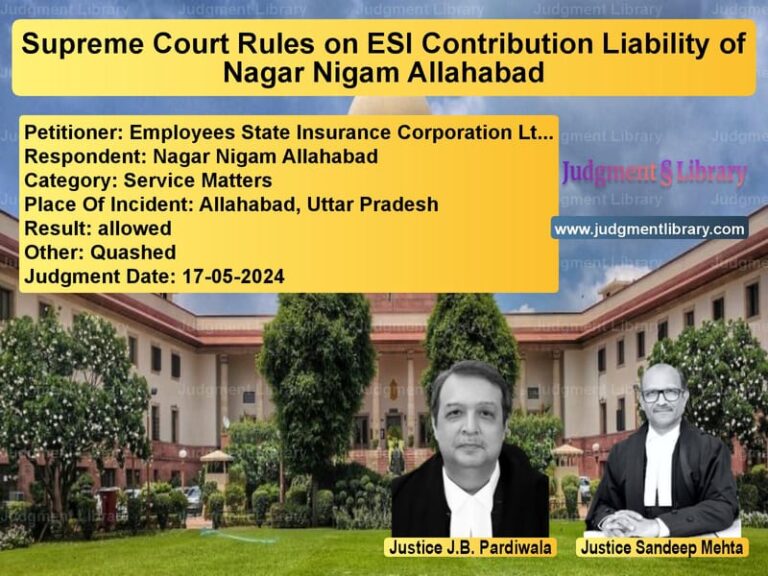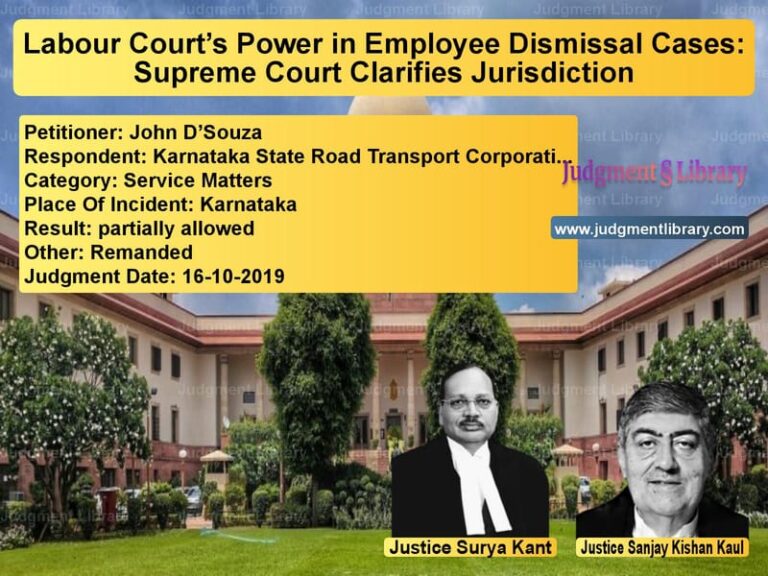Supreme Court Grants Divorce on Grounds of Irretrievable Breakdown of Marriage
The Supreme Court of India recently ruled in the case of Nikesh Kumar vs. Suman Devi, granting a decree of divorce on the grounds of irretrievable breakdown of marriage. The Court exercised its powers under Article 142(1) of the Constitution to dissolve the marriage, considering the prolonged separation of the parties and the absence of any possibility of reconciliation.
Background of the Case
Nikesh Kumar (the appellant) and Suman Devi (the respondent) got married on 8th December 2004. However, conflicts arose between the couple, and on or about 10th November 2005, Suman Devi started living separately from her husband. Since then, the couple has not cohabited.
Following the separation, Nikesh Kumar filed a divorce petition on 15th September 2006 before the Family Court, Hazaribagh, Jharkhand, citing cruelty and desertion as grounds for seeking dissolution of marriage. The Family Court, after considering the evidence and arguments presented by both parties, granted a decree of divorce on 9th August 2012.
Following the grant of divorce, the appellant, Nikesh Kumar, remarried on 29th November 2012 and has a child from his second marriage. However, Suman Devi challenged the divorce decree before the Jharkhand High Court, which ruled in her favor on 2nd July 2018, setting aside the decree of divorce.
Supreme Court’s Review
Challenging the High Court’s decision, Nikesh Kumar approached the Supreme Court, seeking restoration of the divorce decree. The apex court analyzed the facts, legal arguments, and precedents, particularly the ruling in Shilpa Sailesh vs. Varun Sreenivasan (2023 SCC OnLine SC 544), where the Court had laid down various factors to determine irretrievable breakdown of marriage.
Key Factors Considered for Irretrievable Breakdown of Marriage
The Supreme Court outlined several factors to assess whether a marriage has irretrievably broken down:
- The period of time the parties had cohabited after marriage.
- When the parties had last cohabited.
- The nature of allegations made by the parties against each other and their family members.
- The orders passed in the legal proceedings from time to time.
- The cumulative impact on the personal relationship.
- The number of attempts made to resolve the disputes through court intervention or mediation.
- The period of separation, which should be sufficiently long (typically six years or more).
The Court observed that Nikesh Kumar and Suman Devi had been living separately for over 17 years, with no attempts to reconcile. The Court concluded that their marriage had completely failed, and there was no possibility of reunification.
Final Judgment
Based on these findings, the Supreme Court exercised its special power under Article 142(1) of the Constitution and granted a decree of divorce, holding:
- The marriage between Nikesh Kumar and Suman Devi is dissolved.
- The respondent is entitled to financial compensation.
Financial Settlement
The Supreme Court directed Nikesh Kumar to pay a total sum of ₹40,00,000 (forty lakh rupees) to Suman Devi in full and final settlement of all maintenance claims. The payment was structured as follows:
- ₹15,00,000 had already been paid earlier.
- The remaining ₹25,00,000 will be paid in two equal installments:
- ₹12,50,000 on or before 30th November 2023.
- ₹12,50,000 on or before 28th February 2024.
With the fulfillment of this financial settlement, all claims related to maintenance shall stand resolved, and no further claims will be entertained.
Property Settlement
The Court also addressed a property dispute between the parties:
- The appellant had purchased a plot of land in Ranchi, Jharkhand, which was registered in Suman Devi’s name.
- Suman Devi stated that she did not wish to retain the plot.
- The Supreme Court ordered that she must execute a gift deed in favor of either Nikesh Kumar or his current wife.
- The gift deed must be executed and registered by 28th February 2024.
- If Suman Devi fails to execute the gift deed, an officer nominated by the Family Court, Hazaribagh, will execute it on her behalf.
Key Legal Takeaways from the Judgment
This ruling provides crucial clarity on the legal grounds for granting divorce in cases of irretrievable breakdown of marriage. The key takeaways are:
1. Exercise of Article 142(1) for Divorce
The Court reaffirmed its authority under Article 142(1) of the Constitution to dissolve marriages where reconciliation is impossible, even if legal grounds such as cruelty or desertion are not fully established.
2. Long Period of Separation as a Factor
The judgment reinforces that a prolonged period of separation (over six years) is a strong indicator of irretrievable breakdown.
3. Financial and Property Settlements are Crucial
The Court ensured a fair financial settlement, protecting the interests of the financially weaker spouse.
4. Preventing Unjustified Continuation of Marriages
The Court ruled that when a marriage is beyond repair, keeping it legally intact serves no purpose and may cause undue hardship to both parties.
Conclusion
The Supreme Court’s ruling in Nikesh Kumar vs. Suman Devi is a significant precedent in Indian matrimonial law. It emphasizes the importance of recognizing irretrievable breakdown as a valid ground for divorce, ensuring that individuals are not bound in failed marriages indefinitely. The judgment also provides a structured approach to financial settlements, safeguarding the rights of both parties.
Petitioner Name: Nikesh Kumar.Respondent Name: Suman Devi.Judgment By: Justice Sanjiv Khanna, Justice S.V.N. Bhatti.Place Of Incident: Jharkhand.Judgment Date: 20-10-2023.
Don’t miss out on the full details! Download the complete judgment in PDF format below and gain valuable insights instantly!
Download Judgment: nikesh-kumar-vs-suman-devi-supreme-court-of-india-judgment-dated-20-10-2023.pdf
Directly Download Judgment: Directly download this Judgment
See all petitions in Alimony and Maintenance
See all petitions in Property Division in Divorce Cases
See all petitions in Divorce by Desertion
See all petitions in Judgment by Sanjiv Khanna
See all petitions in Judgment by S.V.N. Bhatti
See all petitions in allowed
See all petitions in Quashed
See all petitions in supreme court of India judgments October 2023
See all petitions in 2023 judgments
See all posts in Divorce Cases Category
See all allowed petitions in Divorce Cases Category
See all Dismissed petitions in Divorce Cases Category
See all partially allowed petitions in Divorce Cases Category







